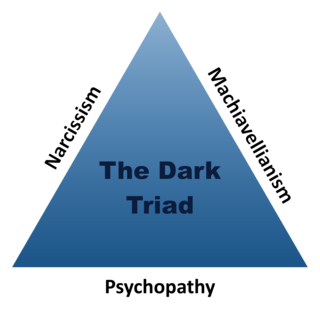Behavior or behaviour is the range of actions and mannerisms made by individuals, organisms, systems or artificial entities in some environment. These systems can include other systems or organisms as well as the inanimate physical environment. It is the computed response of the system or organism to various stimuli or inputs, whether internal or external, conscious or subconscious, overt or covert, and voluntary or involuntary.

Psychology is the scientific study of mind and behavior. Psychology includes the study of conscious and unconscious phenomena, including feelings and thoughts. It is an academic discipline of immense scope, crossing the boundaries between the natural and social sciences. Psychologists seek an understanding of the emergent properties of brains, linking the discipline to neuroscience. As social scientists, psychologists aim to understand the behavior of individuals and groups. Ψ (psi), the first letter of the Greek word psyche from which the term psychology is derived, is commonly associated with the science.
Lifestyle is the interests, opinions, behaviours, and behavioural orientations of an individual, group, or culture. The term was introduced by Austrian psychologist Alfred Adler in his 1929 book, The Case of Miss R., with the meaning of "a person's basic character as established early in childhood". The broader sense of lifestyle as a "way or style of living" has been documented since 1961. Lifestyle is a combination of determining intangible or tangible factors. Tangible factors relate specifically to demographic variables, i.e. an individual's demographic profile, whereas intangible factors concern the psychological aspects of an individual such as personal values, preferences, and outlooks.

In psychology, attitude is a psychological construct that is a mental and emotional entity that inheres or characterizes a person, their attitude to approach to something, or their personal view on it. Attitude involves their mindset, outlook and feelings. Attitudes are complex and are an acquired state through life experience. Attitude is an individual's predisposed state of mind regarding a value and it is precipitated through a responsive expression towards oneself, a person, place, thing, or event which in turn influences the individual's thought and action.

Consumer behavior is the study of individuals, groups, or organizations and all the activities associated with the purchase, use and disposal of goods and services. Consumer behaviour consists of how the consumer's emotions, attitudes, and preferences affect buying behaviour. Consumer behaviour emerged in the 1940–1950s as a distinct sub-discipline of marketing, but has become an interdisciplinary social science that blends elements from psychology, sociology, social anthropology, anthropology, ethnography, ethnology, marketing, and economics.
Moral psychology is a field of study in both philosophy and psychology. Historically, the term "moral psychology" was used relatively narrowly to refer to the study of moral development. Moral psychology eventually came to refer more broadly to various topics at the intersection of ethics, psychology, and philosophy of mind. Some of the main topics of the field are moral judgment, moral reasoning, moral sensitivity, moral responsibility, moral motivation, moral identity, moral action, moral development, moral diversity, moral character, altruism, psychological egoism, moral luck, moral forecasting, moral emotion, affective forecasting, and moral disagreement.
Psychographics is a qualitative methodology used to describe traits of humans on psychological attributes. Psychographics have been applied to the study of personality, values, opinions, attitudes, interests, and lifestyles. Two approaches to psychographics include analysis of consumers' activities, interests, and opinions, and values and lifestyles (VALS).
A lifestyle brand is a brand that attempts to embody the values, aspirations, interests, attitudes, or opinions of a group or a culture for marketing purposes. Lifestyle brands seek to inspire, guide, and motivate people, with the goal of making their products contribute to the definition of the consumer's way of life. As such, they are closely associated with the advertising and other promotions used to gain mind share in their target market. They often operate from an ideology, hoping to attract a relatively high number of people and ultimately become a recognised social phenomenon.
VALS is a proprietary research methodology used for psychographic market segmentation. Market segmentation is designed to guide companies in tailoring their products and services in order to appeal to the people most likely to purchase them.

Shalom H. Schwartz is a social psychologist, cross-cultural researcher and creator of the Theory of Basic Human Values. He also contributed to the formulation of the values scale in the context of social learning theory and social cognitive theory.
Expectancy–value theory has been developed in many different fields including education, health, communications, marketing and economics. Although the model differs in its meaning and implications for each field, the general idea is that there are expectations as well as values or beliefs that affect subsequent behavior.

Edward Tory Higgins is the Stanley Schachter Professor of Psychology, Professor of Business, and Director of the Motivation Science Center at Columbia University. Higgins' research areas include motivation and cognition, judgment and decision-making, and social cognition. Most of his works focus on priming, self-discrepancy theory, and regulatory focus theory. He is also the author of Beyond Pleasure and Pain: How Motivation Works, and Focus: Use Different Ways of Seeing the World for Success and Influence.
Richard E. Petty is university professor of psychology at Ohio State University.
Russell Fazio is Harold E. Burtt Professor of Social Psychology at Ohio State University, where he heads Russ's Attitude and Social Cognition Lab (RASCL). Fazio's work focuses on social psychological phenomena like attitude formation and change, the relationship between attitudes and behavior, and the automatic and controlled cognitive processes that guide social behavior.

Anthony R. Pratkanis is a researcher, author, consultant, media commentator and a professor emeritus of psychology at the University of California, Santa Cruz. He is the author of several books, and has published research papers in scientific journals on the topics of social influence, fraud, terrorist and dictator propaganda, marketing and consumer behavior, and subliminal persuasion.

Psychology encompasses a vast domain, and includes many different approaches to the study of mental processes and behavior. Below are the major areas of inquiry that taken together constitute psychology. A comprehensive list of the sub-fields and areas within psychology can be found at the list of psychology topics and list of psychology disciplines.
Values scales are psychological inventories used to determine the values that people endorse in their lives. They facilitate the understanding of both work and general values that individuals uphold. In addition, they assess the importance of each value in people's lives and how the individual strives toward fulfillment through work and other life roles, such as parenting. Most scales have been normalized and can therefore be used cross-culturally for vocational, marketing, and counseling purposes, yielding unbiased results. Psychologists, political scientists, economists, and others interested in defining values, use values scales to determine what people value, and to evaluate the ultimate function or purpose of values.
John Thomas Jost is a social psychologist best known for his work on system justification theory and the psychology of political ideology. Jost received his AB degree in Psychology and Human Development from Duke University (1989), where he studied with Irving E. Alexander, Philip R. Costanzo, David Goldstein, and Lynn Hasher, and his PhD in Social and Political Psychology from Yale University (1995), where he was the last doctoral student of Leonard Doob and William J. McGuire. He was also a student of Mahzarin R. Banaji and a postdoctoral trainee of Arie W. Kruglanski.

Kay Deaux is an American social psychologist known for her pioneering research on immigration and feminist identity. Deaux is Distinguished Professor Emerita at the Department of Psychology at the Graduate Center of the City University of New York (CUNY). According to Brenda Major, Deaux's work centers on the question of how social categories affect one's psychological makeup, social behavior, and life outcomes, while emphasizing the subjectivity of people's identities and experiences and the larger social context.

In the field of personality psychology, Machiavellianism is a personality trait centered on manipulativeness, callousness, and indifference to morality. Though it has nothing to do with the historical figure or his political thought, the trait is named after the political theorist Niccolò Machiavelli, as psychologists Richard Christie and Florence Geis used edited and truncated statements inspired by his works to study variations in human behaviors. Their Mach IV test, a 20-question, Likert-scale personality survey, became the standard self-assessment tool and scale of the Machiavellianism construct. Those who score high on the scale are more likely to have a high level of deceitfulness and a cynical, unempathetic temperament.







